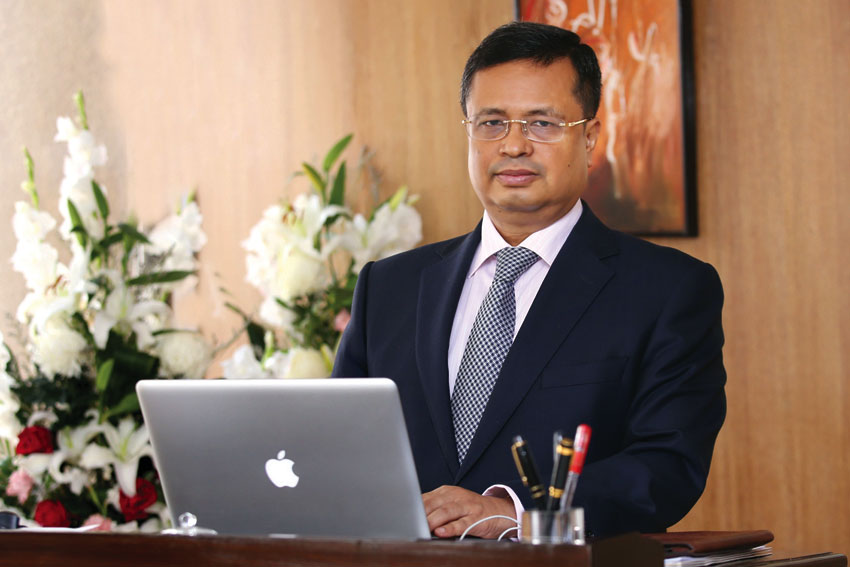United World speaks with Shah A. Sarwar, Managing Director and CEO of IFIC Bank, to discuss the Vision 2021 plan, financial “connection”, and the adoption of new banking technologies

IFIC Bank was established in 1976 as a joint venture between the government and the private sector. The private sector always has an alignment with an aspect of the government vision, and the government vision at the moment is its Vision 2021. Do you believe that achieving the vision of a middle-income country by 2021 is possible?
It is definitely achievable. To achieve any goals, you need three things. Number one: you need commitment, direction and vision. Number two: you need sustainable investments. And number three; you need some kind of political and social stability. These are the three things I find as key factors to any kind of growth and vision, and especially successful implementation and successful carrying forward of any economic vision.
In terms of Vision 2021 and ensuring that Bangladesh becomes a middle-income country, as a commercial bank, we know how to finance the city-based people and their commercial loans, their corporate loans. However, now there is a serious policy direction and encouragement to build a bridge with the common population. We have to connect with the basic economy. But how do we connect?
Bankers like us are now challenged to find the connection. We are trying to build a sustainable economic model whereby not only will the city develop, but also rural areas through rural finance, women’s finance, for SMEs, for agricultural finance, and for microfinance.
The governor of the Central Bank has really highlighted this effort to become more inclusive, which as you said means better connection. How do you see IFIC Bank connecting better with these isolated areas and peoples?
We have embarked on getting the most state-of-the-art technology, and we have hired KPMG to review all of our processes and systems. Now when we talk about better connections, we have 120 branches, and as soon as this technology platform takes off, which is due in June and July, we will try and expand to 400 locations, brick and mortar, so we will be able to cover the entire country. So those will be the hubs, and around it we will create spokes as intermediaries who will scout for those borrowers and bring them to the bank. Then we will deliver the entire product through mobile banking to them.
We are also building a robust risk management system where we can monitor and manage both our product-based portfolio and individual based product portfolio.
Remittances are one of the key drivers for Bangladesh’s economy. How is IFIC Bank positioning itself to receive these remittances?
Remittances are vital to our economy. We have to really find a way of facilitating those remittances so we may deploy them to the rural areas. So we are trying to receive the remittances then distribute them through our mobile banking.
The banking sector is getting more and more competitive, the newest fourth generation banks are moving into the cities and taking some of the market share of the older and bigger private commercial banks. Are you finding that there are areas that are overbanked?
If you were to say that Bangladesh is an overbanked country, I would not agree. At this time we have over 56 banks, but in terms of coverage, it is not very high. The trouble is that these 56 banks are only geared to 48% of the economy. So as a bank, to survive in the future, we have to connect. So that’s a point of differentiation over here, we’re building long term sustainability for this organization.
You’ve touched on and emphasized the need for change and evolution and being able to adapt. In the region there are many opportunities for strategic expansion, where do you see yourself regionally, looking beyond Bangladesh?
That’s a very interesting question; markets in the region are certainly opening up. I can tell you especially some of the Indian banks have done a very good job in their own country in terms of technology, in terms of professionalism, so much so that some of the conventional multinational banks could not compete with them. So we definitely have that in mind, therefore, you might observe that we have taken the best possible technological platform, we have hired the best possible process group to review our processes, so definitely we are going to build that capability constantly, not just to grow within but to grow outside.
As a listed company what is your strategy to continue to return value to shareholders, whilst also maintaining a sustainable business model?
I was trained more as a risk manager so I really want to stick to the fundamentals. We do not want to get into any kind of loans for the sake of profit when many become sour three or four years down the line. We want to stick to the fundamentals and basics of banking where you do business for long-term, not for today. So for the stock market, I have only one message, that we will grow sustainably.
You are a very well respected figure, particularly in the financial community. To those young aspirational Bangladeshis, what would your advice be to them?
This is a very tricky question. I have two daughters and one thing I avoid in my life is advising them, and that keeps us in peace. I can share my own life experience. Throughout my life I tried to stick to the fundamentals. Whenever things were brought to my table, I tried to maintain a serious hardworking attitude. You try to be true to yourself, you must be a person with integrity. The things you do, the actions you do, the relationships you have. Those must be based on some kind of honest dignity and integrity.
0 COMMENTS